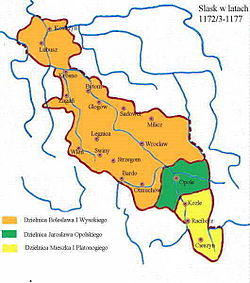Duchy of Opole
Duchy of Opole | |||||||||
|---|---|---|---|---|---|---|---|---|---|
| 1172–1202 1281–1532 | |||||||||
 Silesia 1172-77: Bolesław I the Tall at Wrocław (orange), Mieszko I Tanglefoot at Racibórz (yellow), Jarosław at Opole (green) | |||||||||
| Status | Silesian duchy Fiefdom of Bohemia (1291–1306; 1327–1348) Fiefdom of the Bohemian Crown (until 1742) Part of Prussia (1742–1919) | ||||||||
| Capital | Opole | ||||||||
| Government | Principality | ||||||||
| Historical era | Middle Ages | ||||||||
| 1172 | |||||||||
• United with Racibórz | 1202 | ||||||||
• Split off Racibórz | 1281 | ||||||||
• Vassalized (finally) by Bohemia | 1327 | ||||||||
• Inherited Racibórz | 1521 | ||||||||
• Fell to Bohemia | 1532 | ||||||||
• Annexed by Prussia | 1742 | ||||||||
| |||||||||
Duchy of Opole (German: Herzogtum Oppeln; Czech: Opolské knížectví) was one of the duchies of Silesia ruled by the Piast dynasty. Its capital was Opole (Oppeln, Opolí) in Upper Silesia.

After Bolesław I the Tall and his younger brother Mieszko I Tanglefoot backed by Emperor Frederick I Barbarossa had retained their Silesian heritage in 1163, they divided the territory among themselves into the two duchies of Wrocław and Racibórz. Bolesław originally had the intention to bequest the Duchy of Wrocław as a whole to his son of his second marriage Henry I the Bearded, which caused the protest of his eldest son Jarosław. After a long-term dispute in 1172 the Duchy of Opole was formed with Jarosław becoming the first duke. In turn he was obliged to an ecclesiastical career and became Bishop of Wrocław in 1198.
When Duke Jarosław died in 1201, the Opole lands fell back to his father Bolesław and were briefly incorporated into the Duchy of Wrocław. Bolesław himself however died shortly afterwards and in 1202 Opole was taken by his brother Duke Mieszko I Tanglefoot of Racibórz, who merged it with his duchy, creating the united Upper Silesian Duchy of Opole and Racibórz.
After the death of Mieszko's grandson Duke Władysław Opolski in 1281, his sons again divided the Duchy of Opole and Racibórz and the Duchy of Opole was recreated for Casimir and his brother Bolko I, contemporaneously with the establishment of the duchies of Cziesyn and Bytom on former Racibórz territory. In 1327 the Duchy of Opole was vassalised by the Bohemian king John the Blind.
The Duchy would suffer various territorial changes in the future, mostly becoming increasingly small until the mid-15th century, when it would start to expand again, eventually resulting in the recreation of the Duchy of Opole and Racibórz under Duke Jan II the Good in 1521. Jan however died without issue in 1532 and the Opole line of the Piasts became extinct, whereafter Opole and Racibórz as reverted fiefs were fully under the sovereignty of the Bohemian Crown. It would then fall to Margrave George of Brandenburg-Ansbach from the House of Hohenzollern, who had signed an inheritance treaty with Jan in 1522 and finally reached the consent of the Bohemian king Ferdinand I of Habsburg. From 1645 until 1666 Opole was held in pawn by the Polish House of Vasa, afterwards fell back to the Habsburg kings of Bohemia and finally in 1742 it would be annexed and incorporated into the Kingdom of Prussia.



